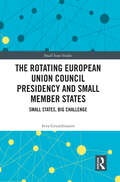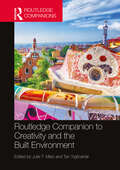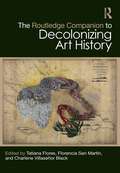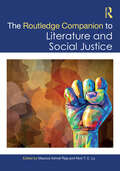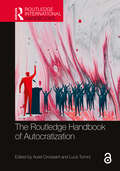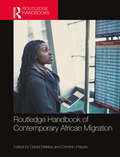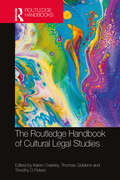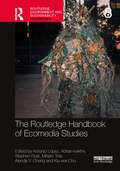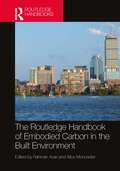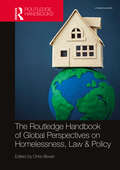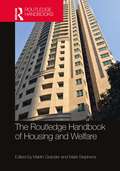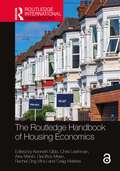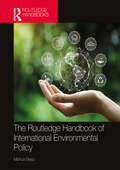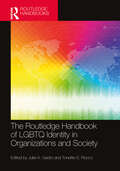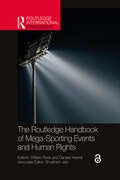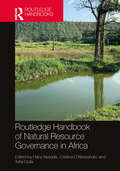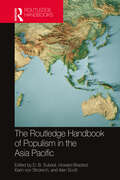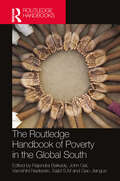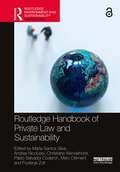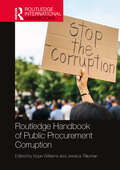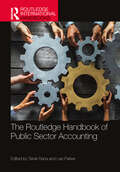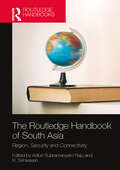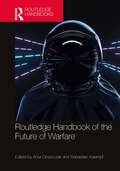- Table View
- List View
The Rotating European Union Council Presidency and Small Member States: Small States, Big Challenge (Small State Studies)
by Ieva GrumbinaitėThe Rotating European Union Council Presidency and Small Member States explores the opportunities and burdens for small states of holding the rotating presidency of the Council of the European Union. While the functions and the achievements of the Council presidencies have been widely studied on the EU level, this book adopts the inverse and under-researched perspective of looking at the "domestic" impact of the Council presidency on the Member State, specifically small Member States. Combining new institutionalist theoretical approaches under the concept of Europeanisation, and employing both qualitative and quantitative methods, this book explores whether the Council presidency leads to Europeanisation of national polities and politics. More specifically, the book looks at the impact of the Council presidency on national administrations, ministers and public opinion. It suggests that the Council presidency presents a unique opportunity to (re)engage with EU affairs and institutions for Member States, especially the small ones and those holding the position for the first time. This book will be of interest to postgraduate students, researchers and academics of International Relations and European Integration, specifically those interested in small states in the European Union or the rotating European Union Council presidency.
Routledge Companion to Creativity and the Built Environment (Routledge International Handbooks)
by Julie T. Miao Tan YigitcanlarThis book crtitically examines the reciprocal relationship between creativity and the built environment and features leading voices from across the world in a debate on originating, learning, modifying, and plagiarizing creativities within the built environment.The Companion includes contributions from architecture, design, planning, construction, real estate, economics, urban studies, geography, sociology, and public policies. Contributors review the current field and proposes new conceptual frameworks, research methodologies, and directions for research, policy, and practice. Chapters are organised into five sections, each drawing on cross-disciplinary insights and debates: Section I connects creativity, productivity, and economic growth and examines how our built environment stimulates or intimidates human imaginations. Section II addresses how hard environments are fabricated with social, cultural, and institutional meanings, and how these evolve in different times and settings. Section III discusses activities that directly and indirectly shape the material development of a built environment, its environmental sustainability, space utility, and place identity. Section IV illustrates how technologies and innovations are used in building and strengthening an intelligent, real-time, responsive urban agenda. Section V examines governance opportunities and challenges at the interface between creativity and built environment. An important resource for scholars and students in the fields of urban planning and development, urban studies, environmental sustainability, human geography, sociology, and public policy.
The Routledge Companion to Decolonizing Art History (Routledge Art History and Visual Studies Companions)
by Tatiana Flores Florencia San Martín Charlene Villaseñor BlackThis companion is the first global, comprehensive text to explicate, theorize, and propose decolonial methodologies for art historians, museum professionals, artists, and other visual culture scholars, teachers, and practitioners. Art history as a discipline and its corollary institutions—the museum, the art market—are not only products of colonial legacies but active agents in the consolidation of empire and the construction of the West. The Routledge Companion to Decolonizing Art History joins the growing critical discourse around the decolonial through an assessment of how art history may be rethought and mobilized in the service of justice—racial, gender, social, environmental, restorative, and more. This book draws attention to the work of artists, art historians, and scholars in related fields who have been engaging with disrupting master narratives and forging new directions, often within a hostile academy or an indifferent art world. The volume unpacks the assumptions projected onto objects of art and visual culture and the discourse that contains them. It equally addresses the manifold complexities around representation as visual and discursive praxis through a range of epistemologies and metaphors originated outside or against the logic of modernity. This companion is organized into four thematic sections: Being and Doing, Learning and Listening, Sensing and Seeing, and Living and Loving. The book will be of interest to scholars working in art history, visual culture, museum studies, race and ethnic studies, cultural studies, disability studies, and women’s, gender, and sexuality studies.
The Routledge Companion to Decolonizing Art History (Routledge Art History and Visual Studies Companions)
by Tatiana Flores Florencia San Martín Charlene Villaseñor BlackThis companion is the first global, comprehensive text to explicate, theorize, and propose decolonial methodologies for art historians, museum professionals, artists, and other visual culture scholars, teachers, and practitioners.Art history as a discipline and its corollary institutions - the museum, the art market - are not only products of colonial legacies but active agents in the consolidation of empire and the construction of the West. The Routledge Companion to Decolonizing Art History joins the growing critical discourse around the decolonial through an assessment of how art history may be rethought and mobilized in the service of justice - racial, gender, social, environmental, restorative, and more. This book draws attention to the work of artists, art historians, and scholars in related fields who have been engaging with disrupting master narratives and forging new directions, often within a hostile academy or an indifferent art world. The volume unpacks the assumptions projected onto objects of art and visual culture and the discourse that contains them. It equally addresses the manifold complexities around representation as visual and discursive praxis through a range of epistemologies and metaphors originated outside or against the logic of modernity. This companion is organized into four thematic sections: Being and Doing, Learning and Listening, Sensing and Seeing, and Living and Loving.The book will be of interest to scholars working in art history, visual culture, museum studies, race and ethnic studies, cultural studies, disability studies, and women’s, gender, and sexuality studies.
The Routledge Companion to Literature and Social Justice (Routledge Literature Companions)
by Masood Ashraf Raja Lu, Nick T. C.The Routledge Companion to Literature and Social Justice is a comprehensive and multi- purpose collection on this important topic. With contributors working in various fields, the Companion provides in- depth analyses of both the cumulative and emergent issues, obstacles, praxes, propositions, and theories of social justice. The first section offers a historical overview of major developments and debates in the field, while the following sections look in more detail at the key traditions and show how literature and theory can be applied as analytical tools to real- world inequalities and the impact of doing so. The contributors provide reviews of major theoretical traditions, including Marxism, feminism, Critical Race Theory, disability studies, and queer studies. They also share literary analyses of influential authors including W. E. B. Du Bois, Yang Kui, Edwidge Danticat, Octavia Butler, and Rivers Solomon amongst others. The final section considers future possibilities for theory and action of justice, drawing specifically from theories and knowledges in decolonial, Indigenous, environmental, and posthumanist studies. This authoritative volume draws on the intersections between literary studies and social movements in order to provide scholars, students, and activists alike with a complete collection of the most up- to- date information on both canonical and emerging texts and case studies globally.
The Routledge Handbook of Autocratization (Routledge International Handbooks)
by Aurel Croissant and Luca TominiThe Routledge Handbook of Autocratization comprehensively and systematically explores the current understanding, and unchartered research paths, of autocratization.With wide-reaching regional coverage and expert analysis from Asia, North and South America, Europa, the Middle East, and North Africa, this handbook reveals cross-country, and cross-regional, analysis and insights and presents in-depth explanations and consequences of autocratization. Arranged in five thematic parts, chapters explore the basic aspects of conceptualization, theorization, and measurement of autocratization; the role of various political and non-political actors as perpetrators, supporters, bystanders, or defenders of democracy against autocratization processes; and the consequences across various policy fields. Showcasing cutting-edge research developments, the handbook illustrates the deeply complex nature of the field, examining important topics in need of renewed consideration at a time of growing concerns for democracy and the global spread of authoritarian challenges to democracy.The Routledge Handbook of Autocratization will be a key reference for those interested in, and studying authoritarianism, democratization, human rights, governance, democracy and more broadly comparative politics, and regional/area studies.Chapter 2 of this book is freely available as a downloadable Open Access PDF at http://www.taylorfrancis.com under a Creative Commons Attribution-Non Commercial-No Derivatives (CC-BY-NC-ND) 4.0 license.
Routledge Handbook of Contemporary African Migration
by Daniel Makina and Dominic PasuraThis handbook provides an authoritative multidisciplinary overview of contemporary African international migration. It endeavours to present a single source of reference on issues such as migration history, trends, migrant profiles, narratives, migration-development nexus, migration governance, diasporas, impact of the COVID-19 pandemic, among others. The handbook assembles a multidisciplinary contributor team of distinguished and upcoming Africanist scholars, practitioners, researchers, and policy experts both inside and outside Africa to contribute their perspectives on contemporary African migration. It attempts to address some of the following pertinent questions: • What drives contemporary migration in Africa? • How are its patterns and trends evolving? • What is the architecture of migration governance in Africa? • How do migration, diaspora engagement and development play out in Africa? • What are the future trajectories of African migration? The handbook is a valuable resource for practitioners, politicians, researchers, university students, and academics interested in studying and understanding contemporary African migration.
The Routledge Handbook of Cultural Legal Studies
by Karen Crawley Thomas Giddens Timothy D PetersThis handbook provides a comprehensive introduction to the cutting-edge field of cultural legal studies.Cultural legal studies is at the forefront of the legal discipline, questioning not only doctrine or social context, but how the concerns of legality are distributed and encountered through a range of material forms. Growing out of the interdisciplinary turn in critical legal studies and jurisprudence that took place in the latter quarter of the 20th century, cultural legal studies exists at the intersection of a range of traditional disciplinary areas: legal studies, cultural studies, literary studies, jurisprudence, media studies, critical theory, history, and philosophy. It is an area of study that is characterised by an expanded or open-ended conception of what ‘counts’ as a legal source, and that is concerned with questions of authority, legitimacy, and interpretation across a wide range of cultural artefacts. Including a mixture of established and new authors in the area, this handbook brings together a complex set of perspectives that are representative of the current field, but which also address its methods, assumptions, limitations, and possible futures.Establishing the significance of the cultural for understanding law, as well as its importance as a potential site for justice, community, and sociality in the world today, this handbook is a key reference point both for those working in the cultural legal context – in legal theory, law and literature, law and film/television, law and aesthetics, cultural studies, and the humanities generally – as well as others interested in the interactions between authority, culture, and meaning.
The Routledge Handbook of Ecomedia Studies (Routledge Environment and Sustainability Handbooks)
by Antonio López Adrian Ivakhiv Stephen Rust Miriam Tola Alenda Y. Chang Kiu-Wai ChuThe Routledge Handbook of Ecomedia Studies gathers leading work by critical scholars in this burgeoning field. Redressing the lack of environmental perspectives in the study of media, ecomedia studies asserts that media are in and about the environment, and environments are socially and materially mediated. The book gives form to this new area of study and brings together diverse scholarly contributions to explore and give definition to the field. The Handbook highlights five critical areas of ecomedia scholarship: ecomedia theory, ecomateriality, political ecology, ecocultures, and eco-affects. Within these areas, authors navigate a range of different topics including infrastructures, supply and manufacturing chains, energy, e-waste, labor, ecofeminism, African and Indigenous ecomedia, environmental justice, environmental media governance, ecopolitical satire, and digital ecologies. The result is a holistic volume that provides an in-depth and comprehensive overview of the current state of the field, as well as future developments. This volume will be an essential resource for students, educators, and scholars of media studies, cultural studies, film, environmental communication, political ecology, science and technology studies, and the environmental humanities.
The Routledge Handbook of Embodied Carbon in the Built Environment
by Rahman Azari Alice MoncasterThis handbook explores the critically important topic of embodied carbon, providing advanced insights that focus on measuring and reducing embodied carbon from across the built environment, including buildings, urban areas and cities, and construction materials and components. Split into five distinct sections, international experts, researchers, and professionals present the recent developments in the field of embodied carbon from various perspectives and at different scales of material, building, and city. Following an introduction to the embodied carbon question, the chapters in Section 1 then cover the key debates around issues such as the politics of embodied carbon, links between embodied carbon and thermal mass, and the misuse of carbon offsets. Section 2 reviews the embodied carbon policies in a selected number of countries. Sections 3, 4, and 5 approach the topic of embodied carbon from urban-, building-, and material-scale perspectives, respectively, and use case studies to demonstrate estimation techniques and present opportunities and challenges in embodied carbon mitigation. This will be important reading for upper-level students and researchers in Architecture, Urban Planning, Engineering, and Construction disciplines. Presenting case studies of embodied carbon assessment, this book will also help practicing architects, engineers, and urban planners understand embodied carbon estimation techniques and different mitigation strategies.
The Routledge Handbook of Global Perspectives on Homelessness, Law & Policy
by Chris BevanThis handbook provides a comprehensive global survey and assessment of the law and policy relating to homelessness prevention. Homelessness is regarded internationally as one of the most pressing issues facing humanity and one of the greatest social challenges of our times. This has been further amplified as a result of the Covid-19 pandemic. Across the globe, there is an enormous divergence in both experiences of and responses to homelessness from governments and state actors. This handbook examines how different jurisdictions from across all five continents of the world have encountered, framed and responded to homelessness. Written by expert scholars and leaders in their field, the book engages in a multidisciplinary and comparative analysis of homelessness as an issue of acute social concern. Understandings of homelessness are geographically, culturally and historically situated, making analysis of each jurisdiction’s approach by a national expert deeply insightful. The collection examines legal and extra-legal policy interventions targeted at reducing or preventing homelessness from across the globe. Drawing on diverse perspectives, differing cultures and welfare regimes, it thus constitutes a timely evaluation of current approaches to homelessness internationally. This book will appeal to students and scholars of homelessness, sociology, social policy, anthropology, and urban sociology, as well as international and national policymakers.
The Routledge Handbook of Housing and Welfare
by Martin Grander Mark StephensThis handbook takes on one of the most pressing issues of today’s society – the question of housing. It is a cutting-edge edited volume about the disputed interrelationship between housing and the wider welfare state. Although housing scholars generally agree that housing should be regarded as part of such a wider welfare system, it has proven hard to pinpoint and operationalize its position within it. Moreover, the relationship became considerably more complex as a result of the period of intense globalization and the integration of national housing finance systems into world finance markets. Furthermore, welfare systems reflect economic as well as social models and these, too, have changed as countries have responded to globalization, and traditional ideological frameworks have become less distinct. Thus, there is a need to redefine the connection between housing and welfare in light of changes in both welfare and housing systems. By investigating the current situation and historical development of housing provision and welfare distribution in different contexts worldwide, this book aims to contribute to an expanded understanding of housing and welfare. The book brings together 25 international housing researchers covering 15 countries worldwide. With such a global approach, the book aims to provide an updated empirical picture and analysis of different housing systems and their connection to the welfare regime in different national contexts. The book moves beyond the usual focus on affordable housing provision in the context of well-developed welfare regimes and includes countries from the global south, incorporating regions where it is debatable whether there are welfare systems present at all. Thus, the book aims to provide the reader with an insight into the large differences in housing provision in international contexts with large differences regarding how the welfare state is comprised. From these insights, we reflect on whether regime approaches continue to provide a suitable theoretical framework for understanding the relationship between housing and the wider welfare state. This handbook is essential reading for researchers, students, policymakers, and other professionals in the fields of housing studies, welfare studies, economics, urban studies, social work, social and public policy, and sociology.
The Routledge Handbook of Housing Economics (Routledge International Handbooks)
by Kenneth Gibb Chris Leishman Alex Marsh Geoffrey Meen Rachel Ong ViforJ Craig WatkinsThe Routledge Handbook of Housing Economics brings together an international panel of contributors to present a comprehensive overview of this important field within economics. Housing occupies an increasingly central role in modern society, dominating consumer assets and spending, forming an important part of social policy and being a large enough market to impact the macroeconomy. This handbook tackles these themes, along with other critical issues such as intergenerational housing inequality and the efficiency and social justice of housing interventions.This volume is structured in four main parts. It starts with eight chapters in microeconomics and housing. This is followed by two shorter sections on macroeconomics and finance. The final main part of the book is concerned with eight chapters on policy dimensions. While many of the chapters are rooted in mainstream economics and finance applied to housing, there are also chapters stressing institutional, behavioural and political economy orientations, as well as those that explicitly challenge more mainstream accounts. The contributing authors are based in Europe, North America and Australia and all draw in international literature to provide state of the art reviews of their topics.This carefully curated handbook will be essential reading for advanced students, researchers and policy makers in housing economics, urban economics, urban planning, public economics and real estate economics and finance.
The Routledge Handbook of International Environmental Policy
by Mahua BasuThis handbook is a one-stop, comprehensive guide to global initiatives for climate action. It examines policies to tackle climate change and the critical role various organizations play.The volume: Includes in-depth discussion of individual issues related to the environment Highlights global initiatives, negotiations, and international organizations responsible for climate action, protecting marine and freshwater environment, protecting atmosphere and climate, conserving biological diversity, chemicals and wastes management, environmental governance, safeguarding against warfare and disasters Debates on-ground implications of the international policies for the Global South Brings together case studies from across the world Presents a toolkit for environment practitioners to seek sustainable and practicable solutions to problems Includes suggested readings for researchers Brings together primary documents, supportive illustrations, graphs, and maps The handbook will be an essential reference for scholars and researchers of environmental studies, environmental policy and governance, sustainability and resilience. It will also be indispensable for policy makers, think tanks and NGOs.
The Routledge Handbook of LGBTQ Identity in Organizations and Society (Routledge International Handbooks)
by Tonette S. Rocco Julie A. GedroSexuality, gender, gender identity, and gender expression are fluid constructs, and the ways in which identity development intersects with organizations and exists in society are complex. The book is comprised of a range of multi-disciplinary and globally inspired perspectives representing leading-edge scholarship by authors from over a dozen countries on a range of issues and contexts regarding LGBTQ identity and experience. It is intended for a wide readership: those who are in LGBTQ-related academic fields; those who want to broaden their coursework by offering supplemental readings that center the perspectives of LGBTQ identities; and those who want to acquire knowledge and education on the subject of LGBTQ identity. There are 36 chapters written by scholars in fields such as social work, law, queer studies, business, human resource management and development, entrepreneurship, criminal justice, economics, marketing, religion, architecture, sport, theater, psychology, human ecology, and adult education. The chapters can be read in sequence, and the book can also be used as a reference work for which educators, practitioners, and non-academics can identify and select particular chapters that inform areas of inquiry.
The Routledge Handbook of Mega-Sporting Events and Human Rights (Routledge International Handbooks)
by William Rook Daniela Heerdt Shubham JainThe Routledge Handbook of Mega-Sporting Events and Human Rights is the first book to explore in depth the topic of mega-sporting events (MSEs) and human rights, offering accounts of adverse human rights impacts linked to MSEs while considering the potential for promoting human rights in and through the framework of these events. Drawing on the contributions of an international group of leading researchers, practitioners and advocates, the book introduces key concepts in human rights and considers how they relate to ethical, social, managerial and governance issues in contemporary MSEs, from inclusion and welfare to corruption and sustainability. It examines the role of key stakeholders in the delivery of MSEs, including organising committees, sport governing bodies, governments, athletes, sponsors and broadcasters, as well as the role of activists and advocates, and presents historical and contemporary case studies of human rights as an active issue in MSEs. The book provides new perspectives on human rights as a lens for understanding modern sport and as a guiding principle for responsible sport that protects the interests of individuals and communities, as well as offering guidance on best practice. It is essential reading for all advanced students, researchers, practitioners, policymakers and stakeholders with an interest in organisation and delivery of MSEs, as well as general sport management, sport policy, sport governance, the ethics of sport, event management, political science, development studies, ethical business or the significance of sport in wider society.
The Routledge Handbook of Mega-Sporting Events and Human Rights (Routledge International Handbooks)
by William Rook Daniela Heerdt Shubham JainThe Routledge Handbook of Mega-Sporting Events and Human Rights is the first book to explore in depth the topic of mega-sporting events (MSEs) and human rights, offering accounts of adverse human rights impacts linked to MSEs while considering the potential for promoting human rights in and through the framework of these events.Drawing on the contributions of an international group of leading researchers, practitioners and advocates, the book introduces key concepts in human rights and considers how they relate to ethical, social, managerial and governance issues in contemporary MSEs, from inclusion and welfare to corruption and sustainability. It examines the role of key stakeholders in the delivery of MSEs, including organising committees, sport governing bodies, governments, athletes, sponsors and broadcasters, as well as the role of activists and advocates, and presents historical and contemporary case studies of human rights as an active issue in MSEs. The book provides new perspectives on human rights as a lens for understanding modern sport and as a guiding principle for responsible sport that protects the interests of individuals and communities, as well as offering guidance on best practice.It is essential reading for all advanced students, researchers, practitioners, policymakers and stakeholders with an interest in organisation and delivery of MSEs, as well as general sport management, sport policy, sport governance, the ethics of sport, event management, political science, development studies, ethical business or the significance of sport in wider society.
Routledge Handbook of Natural Resource Governance in Africa
by Hany Besada, Cristina D’Alessandro and Tefsi GollaThe Routledge Handbook of Natural Resource Governance in Africa provides a comprehensive analysis of African natural resource governance, stretching across the continent, and encompassing water, land, extractive resources, and mining.Africa’s natural resources are not only crucial for the continent from an economic, environmental, and political perspective, but they are also of significant geopolitical importance, with direct implication for meeting the global challenges outlined in the Sustainable Development Goals. Whether an abundance of natural resources proves to be a curse or a blessing depends on the nature, extent, and outcome of the effort and experience of an individual country in governing and managing such assets. It is with this in mind that this ground-breaking handbook brings together experts from across the field of natural resource development to reflect on the varied regime types and paradigms within the continent’s natural resource sectors, the specific challenges they face, and their role within global value chains. The book first considers governance for sustainable development and discourses of land and development financing, before going on to investigate the regulatory and policy impacts, and socioeconomic implications of natural resource management. Finally, the Handbook situates the African continent within the emerging global energy transition; examining trends in South-South cooperation, and new frontiers for the harnessing of critical tools in a sustainable future for natural resource governance and management.Overall, the Handbook’s in-depth analysis provides a unique blend of realism and optimism, highlighting the importance of building a new sustainable African resource narrative for shared prosperity. The handbook will be an essential read for researchers and policy makers with an interest in sustainable development and natural resource governance in Africa.
The Routledge Handbook of Populism in the Asia Pacific (Indo-Pacific in Context)
by D. B. Subedi Howard Brasted Karin Von Strokirch Alan ScottThis handbook brings national and thematic case studies together to examine a variety of populist politics from local and comparative perspectives in the Asia Pacific. The chapters consider key and cross cutting themes such as populism and nationalism, religion, ethnicity and gender, as well as authoritarianism. They show how populist politics alters the way governments mediate state-society relations. The essays in this volume consider: • diverse approaches in populist politics, for example, post-colonial, strategic vs ideational, growth and redistribution, leadership styles, and in what ways they are similar to, or different from, populist discourses in Europe and the United States; • under what social, political, economic and structural conditions populist politics has emerged in the Asia-Pacific region; • national case studies drawn from South, East and Southeast Asia as well as the Pacific analyzing themes such as media, religion, gender, medical populism, corruption and cronyism, and inclusive vs exclusive forms of populist politics; • modes and techniques of social and political mobilization that populist politicians employ to influence people and their impact on the way democracy is conceived and practiced in the Asia Pacific. As a systematic account of populist ideologies, strategies, leaders and trends in the Asia Pacific, this handbook is essential reading for scholars of area studies, especially in the Asia Pacific, politics and international relations, and political and social theory.
The Routledge Handbook of Poverty in the Global South
by Rajendra Baikady John Gal Varoshini Nadesan Sajid S. M. Gao JianguoThis handbook initiates fresh debates on poverty and its impact in a constantly changing Global South society. It studies the concept, theories, and causes of poverty, as well as the design and delivery of social welfare policies related to specific groups, such as women, children, and the elderly. The chapters are theoretical, evidence-based, and empirical in nature and bring together a holistic understanding of social problems and issues in developing countries. The volume brings together researchers, educators, and practitioners from across the globe to develop a hands-on reference work that will be requisite for several social science disciplines concerned with poverty and the welfare of poor people. The first of its kind, the handbook will be indispensable for scholars and researchers of development studies, economics, social work, political studies, poverty studies, population and demographic studies, sociology, social anthropology, public policy, and political economy, especially those concerned with the Global South.
Routledge Handbook of Private Law and Sustainability (Routledge Environment and Sustainability Handbooks)
by Marta Santos Silva Andrea Nicolussi Christiane Wendehorst Pablo Salvador Coderch Marc Clément Fryderyk ZollThe Routledge Handbook of Private Law and Sustainability reflects on how the law can help tackle the current environmental challenges and make our societies more resilient to future crises.Sustainability has been high on the political agenda since the approval of the Sustainable Development Goals in 2015 and the EU Green Deal in 2019. The Green Agenda aims at making Europe the first climate‑neutral continent by 2050, but humanity persists in an ecological overshoot that puts at risk the survival of species, including that of our own. Drawing together a selection of leading thinkers in the field, this Handbook provides a curated overview of the most recent and relevant discussions for private lawyers related to environmental and sustainability concerns. The authors delve into case study examples from 20 countries in Europe and beyond and discuss a wide range of issues, including new property law and consumer law paradigms, the use of legal tech for promoting sustainable property management, strategies for fighting planned obsolescence, eco‑design, the servitisation economy, advances on corporate climate litigation and mandated green private sludges. Overall, the volume is designed to empower new generations of legal scholars to take an active role in the transition to a more sustainable future. It will also assist policymakers in producing better policy, through pinpointing the main legal issues that need to be addressed and offering a comparative overview of legal solutions and best practices.Divided into six key parts and overseen by a team of internationally recognised expert editors, this Handbook will be an essential resource for students, scholars, private lawyers and policymakers who wish to have a comprehensive, fundamental overview of how environmental sustainability concerns reflect on private law.
Routledge Handbook of Public Procurement Corruption (Routledge International Handbooks)
by Sope Williams Jessica TillipmanThe Routledge Handbook of Public Procurement Corruption showcases the most innovative and exciting research being conducted in this important area of study, providing a comprehensive go-to reference for all who are interested in the topic.During the COVID-19 pandemic, the global race for health and ancillary goods amid global supply chain disruptions demonstrated that, when tested, all countries are incredibly vulnerable to fraud and corruption in public procurement, irrespective of their level of development. Yet despite the widespread nature of the problem, there remains a lack of in-depth, analytical, and cross-country investigations into public procurement corruption. This book addresses this gap by providing a comprehensive, multidisciplinary, geographically balanced treatise on corruption in public procurement. It combines country-specific studies to allow readers to easily compare differing perspectives and approaches and overarching thematic chapters to reflect on new and cutting-edge issues in procurement and their implications for procurement corruption. Key sectors such as healthcare and infrastructure are considered, as well as the role of new technologies, in both combatting and enabling procurement corruption.This Handbook provides academics, practitioners, and graduate researchers of public administration, law, and anti-corruption with all of the tools they need to understand the nuances of public procurement corruption around the world.
The Routledge Handbook of Public Sector Accounting (Routledge International Handbooks)
by Tarek Rana Lee ParkerThe Routledge Handbook of Public Sector Accounting explores new developments and transformations in auditing, management control, performance measurement, risk management and sustainability work in the contemporary world of the public sector and the functioning of accounting and management in that realm. It focuses on critical analysis and reflection with respect to changing risk and crisis management patterns in the public sector in the current Covid- 19 and post- Covid- 19 era, across diverse social, political and institutional settings globally. This research-based edited book, targeted at scholars, professionals, teachers and consultants inthe fields of public sector accounting, auditing, accountability and management, offers high-level insights into the new architecture and execution of such activities in the emerging post-pandemic world. The chapters are written by leading scholars in the accounting and public administration disciplines internationally and provide important assessments, frameworks and recommendations concerning a wide variety of institutions, practices and policies with a view to addressing the many emerging societal, governmental and professional issues. Spanning theoretical, empirical and policy discussion contributions, the book’s chapters will be readily accessible to accounting, auditing and management audiences alike.
The Routledge Handbook of South Asia: Region, Security and Connectivity
by Adluri Subramanyam Raju R. SrinivasanThis handbook presents an authoritative overview of South Asia through the lens of geopolitics, political dynamics, economics, human security, and sustainable development. It brings together key insights from various disciplines to provide an in-depth understanding of the genesis, course, and future potential of South Asia as a region. The handbook: • Explores the post-colonial political landscape of India, Pakistan, Sri Lanka, the Maldives, Nepal, Bhutan and Afghanistan and analyses the challenges to political stability and governance in South Asia. • Studies the opportunities and challenges produced by globalization and recommends solutions towards greater connectivity and trade in South Asia. • Delves into the issues of climate change, water and land resource dependency, and energy security and singles out policy challenges as well as positive actions to promote sustainable development and implement the blue economy. • Discusses the political dynamics of regional cooperation between countries and the role of China in South Asian regional affairs. An invaluable addition to the study of South Asia, this volume will be an indispensable resource for scholars, teachers and researchers of political science, international relations, South Asia studies, South Asian politics, history, defence and strategic studies, political economy, developmental studies, public policy and sustainability studies.
Routledge Handbook of the Future of Warfare
by Artur Gruszczak Sebastian KaempfThis handbook provides a comprehensive, problem-driven and dynamic overview of the future of warfare. The volatilities and uncertainties of the global security environment raise timely and important questions about the future of humanity’s oldest occupation: war. This volume addresses these questions through a collection of cutting-edge contributions by leading scholars in the field. Its overall focus is prognostic rather than futuristic, highlighting discernible trends, key developments and themes without downplaying the lessons from the past. By making the past meet the present in order to envision the future, the handbook offers a diversified outlook on the future of warfare, which will be indispensable for researchers, students and military practitioners alike. The volume is divided into six thematic sections. Section I draws out general trends in the phenomenon of war and sketches the most significant developments, from the past to the present and into the future. Section II looks at the areas and domains which actively shape the future of warfare. Section III engages with the main theories and conceptions of warfare, capturing those attributes of contemporary conflicts which will most likely persist and determine the dynamics and directions of their transformations. The fourth section addresses differentiation and complexity in the domain of warfare, pointing to those factors which will exert a strong impact on the structure and properties of that domain. Section V focuses on technology as the principal trigger of changes and alterations in the essence of warfare. The final section draws on the general trends identified in Section I and sheds light on how those trends have manifested in specific local contexts. This section zooms in on particular geographies which are seen and anticipated as hotbeds where future warfare will most likely assume its shape and reveal its true colours. This book will be of great interest to students of strategic studies, defence studies, war and technology, and International Relations.
